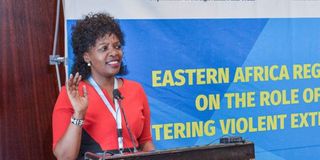How a free press can tame violent extremism in Eastern Africa

Zubeidah Kananu, the new President of the Kenya Editors Guild on May 3, 2023, during the two-day conference in Nairobi that brought together press freedom lobbies, journalists and representatives of various organisations from the Eastern Africa region.
Journalists in the wider Eastern Africa region are using the press freedom week to vow maximum support against violent extremism and terrorism, but want authorities to back up their work with a safe environment.
The deliberations emerged from a two-day conference in Nairobi last week, bringing together press freedom lobbies, journalists and representatives of various organisations from the region.
The practitioners from Kenya, Burundi, Djibouti, Rwanda, Somalia, Sudan, South Sudan, Tanzania and Uganda issued the first-ever declaration on Saturday to commit to work in the interest of thousands of journalists facing threats of violence, targeted attacks and other reprisals in their line of duty.
The journalists say that terror merchants in the region have often targeted reporters and that authorities should be more protective of the media as it can aid weed out extremism.
Zubeidah Kananu, the new President of the Kenya Editors Guild told the audience the changing dynamics in the media landscape require journalists to be up to date with their responsibilities.
She said journalists and media outlets must “remain alive to the changing circumstances of the work environment and the attendant responsibilities and dynamics,” arguing that the media should remain on the frontline countering and preventing “the proliferation of terrorist narratives to deny them the legitimacy they would wish to claim.”
At the conference co-organised by the Kenya Union of Journalists (KUJ) and the National Union of Somali Journalists (NUSOJ) and funded by Australia’s Department of Foreign Affairs and Trade (DFAT), participants say they want a collaborative relationship with security forces especially on access to information and safe locations that would allow them to report safely and objectively on counter-terrorism operations and terrorist attacks.
“The question we need to find answers to is how can media report effectively on violent extremism without being targeted by their own governments and extremist groups?” posed Mr Pa Louis Thomasi, Director of the Africa office of the International Federation of Journalists (IFJ), at the conference.
They also said governments must be ready to punish officials who threaten or harm journalists in a culture of impunity.
In Somalia, NUSOJ Secretary-General Omar Faruk Osman said journalists in his country have in the past been targeted by terrorists, but added there is a growing trend where government officials abuse their powers to silence reporters.
“These journalists were mostly killed while covering terrorist attacks and bombings or they were deliberately targeted by terrorists for practicing journalism and refusing to be the mouthpieces of extremists and terror networks,” he said reflecting on the murders by terrorists over the last 15 years where some 80 journalists have been killed.
“At the same time, different armed forces and governmental agencies tend to treat them with suspicion and subject them to harassment or even violent attacks. It is high time that governments recognise the fundamental role of journalists as communicators and see them as allies in the fight against violent extremism and terrorism,” he concluded.
While authorities have often used security challenge to restrict reporting, Mr Erick Oduor, Secretary-General of the KUJ said adequate training will be necessary to ensure the media and journalists earn the skills to report safely and effectively in a region that was increasingly vulnerable to terrorist attacks.
That may require wider reforms, however, including amendments on laws to guarantee lack media freedom, freedom of expression, and freedom of information. Delegates agreed that lawmakers should do more to ensure that national pieces of legislation were fully aligned with the principles enshrined in international conventions on human, civil, and political rights as well as safe working conditions.
“The media holds a challenging role as informers of society amid increasing efforts by extremists to use their channels as a vehicle to spread their destructive narratives,” said Luke Williams, Australian High Commissioner to Kenya, and Ambassador to Somalia, at the opening session on May 2.
“Australia is committed to collaborating with our Eastern African partners to promote peace and stability in the region, which is why we are supporting initiatives, such as this conference, which are contributing to the prevention of violent extremism and terrorism.”
Ngandeu Ngatta Hugue, the Head of Unit for the UNESCO regional office for Eastern Africa, said a free press is good for democracy and institutional building which ultimately reduces extremism. The media, the official added, can help block disinformation, often used by terrorists, to fuel extremism.
The declaration issues on Saturday said regional bodies such as the East African Community (EAC), the Inter-Governmental Authority on Development (IGAD), and the African Union (AU) can support press freedom by pushing for self-regulation and gender equality into national laws.





